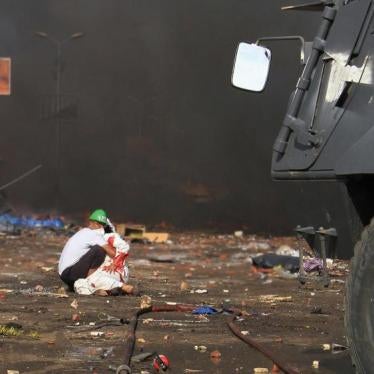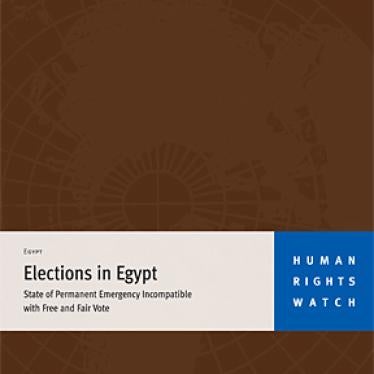July 30, 2015
The Honorable John F. Kerry
Secretary of State
United States Department of State
Harry S. Truman Building
2201 C Street, NW
Washington, DC 20520
Re: US-Egypt Strategic Dialogue
Dear Secretary Kerry,
We understand you will soon head to Cairo for the upcoming US-Egypt Strategic Dialogue, where we strongly urge you to make political reform, human rights, and fundamental freedoms a central part of the agenda. Without more robust attention, we are concerned that the deteriorating human rights situation in Egypt will reinforce the country’s dangerous path and make it increasingly difficult for the US to effectively cooperate with the Egyptians on a wide range of issues.
In addition, we are worried that the recent decision to fully resume military aid appears to be an endorsement of Egypt’s policy of muzzling independent voices and squeezing political space. With this in mind, we wanted to take this opportunity to provide you with a brief update from our research. We are highlighting several key issues we believe need to be on the official agenda while also making clear, privately and publicly, that the US wants to see Egypt’s current trajectory reversed.
In particular, we are concerned about the many people detained for exercising their rights to free expression and association, including those imprisoned solely for taking part in peaceful protests or belonging to political groups. At present, thousands of people have been caught up in the government’s crackdown that began in 2013 and remain detained without trial, while others have been convicted without due process or after unfair trials. As you know, the range of detainees is wide – from Khaled al-Qazzaz, a senior advisor to former President Mohamed Morsy who, though released from prison without charge, still cannot leave the country, to Yara Sallam, a lawyer and human rights defender who is serving a two-year prison sentence for allegedly participating in a peaceful demonstration. According to the Committee to Protect Journalists, at least 18 journalists were jailed as of June 1, 2015, including Mahmoud Abou Zeid, also known as Shawkan, a photojournalist arrested on August 14, 2013, who has been held without charge in pretrial detention for nearly two years. We urge you to press for al-Qazzaz to be able to leave the country with his family and for Sallam to be released.
As you know, Egyptians are enduring more serious human rights violations than before the 2011 uprising and a political crackdown that rivals any in their modern history. There is every indication that al-Sisi’s approach to addressing insecurity and instability is making the situation only worse. In the Sinai Peninsula, a serious insurgency and harsh counter-terrorism response may have claimed thousands of lives, while attacks on security forces in mainland Egypt continue unabated. In fact, closing off avenues for peaceful dissent and allowing near complete impunity for security forces could fuel greater radicalization – not lessen it.
Specifically, we note the following issues:
-
Egyptian authorities arrested, indicted or sentenced at least 41,000 people following al-Sisi’s removal of President Morsy in July 2013. The government has never provided a full and transparent accounting of this arrest campaign. In response to inquiries from a fact-finding committee in July 2014, the Interior Ministry admitted that nearly 7,400 people arrested in the wake of Morsy’s overthrow remained in pre-trial detention. Many were arrested only for protesting or for alleged links to the Muslim Brotherhood, the nearly century-old Islamist movement that the government banned and labeled a terrorist organization. Authorities house many detainees in police stations, camps, and military bases, where torture, overcrowding and inadequate medical treatment have led to rising deaths. At least 124 Egyptians have died in the custody of the security forces since August 2013, according to independent Egyptian groups.
-
The government has made it nearly impossible for independent civil society groups to function. In September 2014, al-Sisi issued a law providing for life imprisonment for anyone who receives foreign funding – the major source of many key nongovernmental organization (NGO) budgets – for the undefined purpose of harming Egypt’s “national interest” or “unity.” The government has moved for the first time to force all NGOs to register under a 2002 law that gives the authorities power to dissolve them and veto their funding and board membership. An investigating judge has restarted a case looking into local NGOs’ foreign funding and has dispatched investigators to inquire about their budgets and registration documents. Several leading NGOs have either relocated their operations abroad or halted important programs.
-
Al-Sisi issued a law in October 2014 allowing military courts to try civilians for crimes that take place on state and public property, and around 3,000 people have since been referred for prosecution. The government also created special national security courts to try terrorism cases, courts which have handed down mass sentences against Muslim Brotherhood leaders and protesters. Since Morsy’s removal, courts have sentenced at least 670 people to death in political cases, though Egypt’s highest appeals court has ordered retrials for many of these. In February, a court sentenced 230 people, including leading liberal activist Ahmed Douma, to life in prison for a 2011 protest. Another court is currently hearing the case of 494 people arrested in August 2013, during the unrest that followed Morsy’s removal, who are collectively charged with the murder of one man, damage to a police station, and other crimes.
We strongly believe Egypt’s current repressive approach, which it claims is intended to address security threats, is deeply counterproductive and that stability will remain elusive unless there is significant political reform that adheres to the principles of basic rights. We hope you will take these developments into account as you prepare for meetings in Cairo.
Many thanks in advance for your time.
Sincerely,
Sarah Margon
Washington Director








